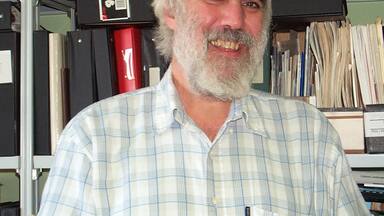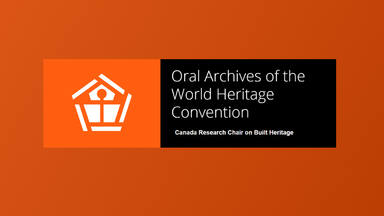
Interview
Herb Stovel
1948-2012
World Heritage Convention
A graduate in architecture from McGill University in Montreal, Herb Stovel became a world leader in heritage conservation and management.
His impressive career included work as an academic, consultant and member of several international organizations. He taught in the University of Montreal's Built Environment Conservation Program from 1990 to 1993 and then in the Canadian Studies program at Carleton University from 2006 until his death in 2012. Involved in several conservation organizations, he was President of the Association for Preservation Technology from 1989 to 1991, Secretary General of ICOMOS from 1990 to 1993, President of ICOMOS Canada from 1993 to 1997 and Director Of the Heritage Settlements Unit at ICCROM from 1998 to 2004. In 2011, he received the ICCROM Prize for his important contribution to the field of conservation and protection of cultural heritage.
Herb Stovel’s formal involvement with World Heritage began in 1990 at the annual session of the World Heritage Committee in Banff. During his tenure as Secretary General of ICOMOS, he coordinated the evaluation process for cultural properties proposed for inscription. He was subsequently one of the main editors of the Nara Document on Authenticity in 1994. At ICCROM, he coordinated the organization's advisory role to the World Heritage Committee on management and training issues. Among his numerous publications are Risk Preparedness: A Management Manual for World Cultural Heritage jointly published by ICOMOS, ICCROM and the World Heritage Center in 1998. More recently, he also published (with Nicholas Stanley- Price and Robert Killick) Conservation of Living Religious Heritage, published by ICCROM in 2005.
Interview with
Herb Stovel
3 February, 16 March
and 5 April 2011,
Ottawa, Canada
The following audio excerpts are from three interviews with Herb Stovel by Christina Cameron in February, March and April 2011. They highlight his leading role in the development of the World Heritage Convention and testify to his positive and critical views about its implementation. With his multi-faceted experience of the Convention, Herb Stovel offers frank and philosophic comments on the objectives, achievements and challenges of the various actors involved in the complex workings of World Heritage.
- 1. The World Heritage Convention
- 1a. Implication and role of Herb Stovel in World Heritage
- 1b. Involvement and role of Herb Stovel in World Heritage: ICCROM and after
- 1c. Objectives of the World Heritage Convention
- 1d. The World Heritage List
- 1e. Key moments and decisions in the implementation of the Convention
- 1f. Global appraisal of the successes and failures of the Convention
- 2. The Advisory Bodies:
- 2a. Assessment of the performance of ICOMOS, ICCROM and IUCN
- 2b. Role of Advisory Bodies in the development and implementation of the Global Strategy
- 3. UNESCO Secretariat
- 4. The commitment of States Parties
- 4a. Conservation of sites inscribed on their territory
- 4b. Respect for World Heritage all over the world
- 4c. Collective conservation actions
- 5. Process for monitoring the state of conservation of World Heritage sites
Oral Archives of the
World Heritage Convention
Under the leadership of the Canada Research Chair on Built Heritage at the University of Montreal, an international team of researchers conducts interviews with pioneers of World Heritage to capture memories of important moments in the history of UNESCO Convention.
Launched in 2006, this initiative is part of the UNESCO History project that celebrated the 60th anniversary of the creation of UNESCO. The Oral Archives project records the precious witness of people closely associated with the creation and implementation of the Convention. Their recollections and views have greatly enriched the book by Christina Cameron and Mechtild Rössler, Many Voices, One Vision: The Early Years of the World Heritage Convention (Ashgate/Routledge, 2013).

